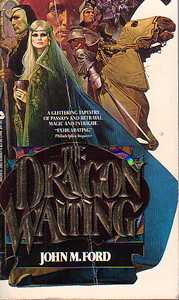It’s so easy to talk about how clever The Dragon Waiting is that it’s easy to lose sight of what good fun it is, so I wanted to start with this. It’s a brilliantly written, absorbing book with great characters; it’s hard to put down once it gets going; and it’s laugh aloud funny in places. This is John M. Ford’s World Fantasy Award-winning masterpiece, and it really is notably brilliant. It’s a historical fantasy that plays games with history. I suppose lots of historical fantasies and alternate histories play games with history, but most of them are playing tic-tac-toe while The Dragon Waiting is playing three-dimensional Go.
It’s a Richard III book, though it takes a while to figure that out. Indeed, it takes a while to figure it out at all, because the first part that introduces the three main characters seems like the beginning of three different books, set in three different worlds. The wizard Hywel Peredur lives in a post-Roman Wales, the boy Dimitrios Ducas lives in a Gaul reconquered by Byzantium, and the doctor Cynthia Ricci lives at the Renaissance court of Lorenzo the Magnificent. Yet this is all one world and the three of them meet up with Gregory von Bayern, a vampire gun-maker, at an inn in an Alpine mountain pass, and go on together to work against Byzantium’s designs for reconquering Britain, and suddenly we are into the reality of the Wars of the Roses, the plotting nobles, the princes in the tower, vampires, wizards, Henry Tudor with Byzantine backing, exploding guns, dragons, witches, ciphers, poisons, and intrigue.
The world is an alternate history where Julian the Apostate lived to ensure no one faith had priority over any other, and everyone is largely pagan. I don’t think anyone else has written a feudal world without Christianity that I’m convinced by, nevermind medieval Europe, so this in itself is a major achievement. Justinian and Theodora became vampires, and held onto and consolidated Belisarius’ reconquest of half of Italy, going on to divide up France between themselves and the English crown. Now they’re mopping up the rest of Italy.
Real-world Byzantium fell in 1453. It’s hard to feel all that sorry the alternate world counterpart is trying to swallow up all of Europe fifty years after that, which makes them an interesting choice of bad guys. We never see them all that clearly, what we mostly see are the individuals manipulated by them, not Byzantium itself. Still, it makes a convincing menace.
I normally hate alternate histories where the turning point was hundreds of years before and yet there are characters with the same names and characters, but it doesn’t bother me at all here. I think I don’t mind it because Ford does it so perfectly, and not only that but he knows the history and geography so well that he never puts a foot wrong. There are very few books written by Americans and set in Britain (and only this one in Wales) where the geography works and the scale of the landscape feels right. (Similarly, I’d never dare set anything in the US.) Ford knows the real history well enough that it sits up and does tricks for him.
Similarly, if there’s one thing that puts me off a book it’s vampires. Yet The Dragon Waiting has a major vampire character and a plot and backstory that rely on vampires. It helps that they’re not sexy, or attractive, it helps that they’re much more like heroin addicts and that Gregory is using animal blood as methadone. Most of all, it helps that it doesn’t have vampires because vampires are cool, but because vampires are necessary. At least it doesn’t have any pirates. (But perhaps Ford could have made me like pirates, too. He made me almost like a Star Trek novel, after all.)
The characters are wonderful, all the way through. The book gives you time to get to know them and then uses them in precise ways, so you feel they’re doing exactly what they would do. This is true even of minor characters. It also uses Arthurian motifs to underscore the story, without ever getting tangled up in them. Part of the satisfaction of re-reading a complex book like this is seeing the mechanism, knowing what’s going to happen and seeing the inevitability of each action. It’s surprisingly hard to do that with this—it’s hard to hold onto. It’s as if in twisting the tail of history Ford could somehow manage to twist his own tale and make it come out differently.
What a good book this is, what an enjoyable read, and how incredibly clever. I love it.
It’s not likely to have a US reprint soon, so I’d grab this attractive Gollancz “Ultimate Fantasies” edition while it’s available.
Jo Walton is a science fiction and fantasy writer. She’s published eight novels, most recently Half a Crown and Lifelode, and two poetry collections. She reads a lot, and blogs about it here regularly. She comes from Wales but lives in Montreal where the food and books are more varied.










